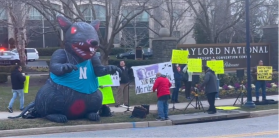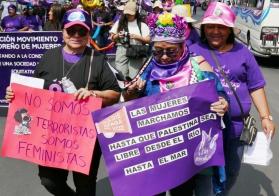Inflation Threatens Food Security of Salvadoran Families
El Salvador has registered the highest inflation rate since the dollarization of the economy in 2001, increasing 6.11% as of December 2021 according to data from the General Directorate of Statistics and Censuses (DIGESTYC).
This increase represents a serious threat for Salvadoran families, especially those living in poverty. "The Salvadoran population is facing a situation in which food and nutritional security is being affected,” explains Danilo Pérez, director of the Center for the Defense of the Consumer, in an interview with CISPES, “which may put at risk the right to adequate food.”
Based on data from his organization, Perez highlights that as of November 2021, the price of food staples, also known as the "basic food basket", had increased by $14.90 and $11.52, for the urban and rural sectors, respectively. Likewise, according to a survey recently published by the Central American University, José Simeón Cañas (UCA), 93.1% of citizens note an increase in the price of food staples over the past year.
Adalberto Blanco, representative of the Roundtable for Food Sovereignty, explained to CISPES that “the direct impact of the increase in food prices has meant that some families have had to employ strategies such as reducing their meals per day or food portions.” Meanwhile, "their livelihoods are threatened, since they find it necessary to sell animals and food reserves or hunt in some extreme cases" in order to be able to secure food.
Added to the increase in the price of food staples are other expenses such as electricity, which has seen an increase of between 8.4% and 10.4% in January; medicines, which have registered a rise of 3.1%; and transportation, which has risen approximately 9.4%; among others.
"Inflation especially affects those families with low economic income and those headed by women," says Blanco. “However, we have not seen any public policy aimed at supporting female-headed households or households in rural areas. The purchase of bitcoin has been prioritized over the care, health, or nutrition of the Salvadoran population,” he says.
"In terms of public policy, we are seeing that megaprojects are being promoted that will benefit the same people as always, the millionaires of this country, and we do not see policies that benefit the most vulnerable populations," says Blanco. "The government has to stop playing with public money to buy bitcoin and redirect [investment in] these megaprojects to projects that safeguard life and do not destroy it," he says.
In this sense, Danilo Pérez adds that in the tax system of El Salvador "those who earn the least are those who are contributing the most,” for which his organization, the Center for the Defense of the Consumer, has proposed an income exemption for people who earn less than $1,000/month, in order to increase their purchasing power.
Both Blanco and Pérez warn that the country's economic outlook is rather pessimistic, since the government is not taking measures aimed at mitigating the impact of inflation for Salvadoran families.
"At the moment we do not see much encouragement that the situation in the country will improve; on the contrary, we see uncertainty and opacity in the management of public policy and accountability, and we do not see that this can be solved in the short term," Blanco concludes.
Related, in 2020, the DIGESTYC Multi-Purpose Household Survey recorded a 3.4% increase in poverty compared to 2019, which means that approximately 1.6 million Salvadorans are living in poverty, a figure that could increase with the sustained rise in inflation reported in 2021.

 "I am a CISPES supporter because continuing to fight for social justice and a more people-centered country means continuing the dream and sacrifice of thousands of my fellow Salvadorans who died for that vision.” - Padre Carlos, New York City
"I am a CISPES supporter because continuing to fight for social justice and a more people-centered country means continuing the dream and sacrifice of thousands of my fellow Salvadorans who died for that vision.” - Padre Carlos, New York City

